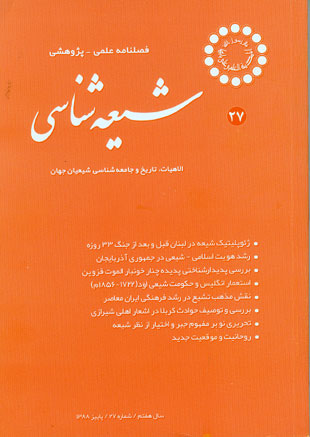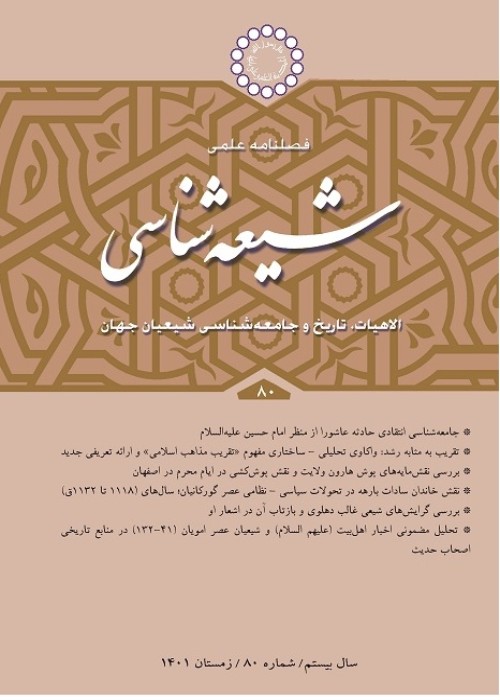فهرست مطالب

فصلنامه شیعه شناسی
پیاپی 27 (پاییز 1388)
- 280 صفحه، بهای روی جلد: 15,000ريال
- تاریخ انتشار: 1389/01/15
- تعداد عناوین: 8
-
-
صفحه 35جمهوری آذربایجان نه تنها کشوری اسلامی است، بلکه بسط دهنده هویت ایرانی شیعی تلقی می شود; چه اینکه تقریبا 75 درصد آذربایجانی ها شیعی هستند. در این مقاله با یک نگاه تاریخی، به نقش اسلام و شیعه می پردازیم. عناصر تشکیل دهنده هویت این جمهوری عبارت اند از: مذهب شیعی، زبان ترکی، اندیشه تاریخ مشترک و مجموعه هنجارهای فرهنگی; همچنین مؤلفه های تشکیل دهنده سیاست این کشور ترکیبی از عوامل تاریخی و شیعی است; با این تفاوت که عنصر مذهب، نقش مشروعیت بخشی نظام سیاسی را بر عهده دارد.
در این نوشته، اسلام در پنج لایه مورد بررسی قرار گرفته است: 1. روحانیت; 2. زیارتگاه ها; 3. رهبران مذهبی سنتی; 4. احزاب اسلامی; 5. روشنفکران مسلمان.
با توجه به این لایه ها، علی رغم نفوذ سلفی ها و بنیادگراها، در آسیای مرکزی و قفقاز، شاهد آنیم که به دلیل شیعی بودن جمهوری آذربایجان، ایشان از نفوذ کمتری برخوردارند.
کلیدواژگان: شیعه، اسلام، رادیکال، سلفی گری، هویت اسلامی -
صفحه 55در این مقاله موضوع جاری شدن خون از درختی در زرآباد قزوین، معروف به «چنار خونبار» در روز عاشورا مورد بررسی انسان شناختی قرار گرفته است. نگارنده با تلقی موضوع به عنوان یک «پدیده اجتماعی تام» و با بهره گیری از تکنیک های مختلف، تلاش می کند از جنبه های مختلف، ابهامات را شفاف نماید. یافته های پژوهش چنین است: بر اساس آزمایش انجام گرفته، ماده مترشحه از چنار ماهیت خونی ندارد، بلکه صمغ ویژه ای است که بر خلاف سایر صمغ ها پس از جریان یافتن، خشک می شود. رابطه علی میان عاشورا و جریان صمغ اثبات نمی شود; حداکثر یک رابطه تقارن است; زیرا جریان صمغ در سایر ایام نیز قابل مشاهده است. آنچه بر مردم پدیدار می شود، حاصل نگرش آنها به موضوع بوده است و هیچ گونه تصنعی در بین نیست; از این رو هر آنچه مردم احساس می کنند، بیشتر از واقعیت به ذهنیت شان نزدیک است.
کلیدواژگان: انسان شناسی، چنار خونبار، زرآباد، پدیدارشناسی، عاشورا -
صفحه 113در این تحقیق تلاش شده تا نقش انحصاری تشیع در رشد فرهنگ و تمدن و حتی جلوه های مادی ایران زمین در قرن گذشته به تصویر کشیده شود و نشان دهد که چگونه مذهب تشیع توانسته فرهنگی تمدن ساز را در این مرز و بوم رشد دهد و خصوصا با هجوم فرهنگ غرب این مذهب بیشتر کارایی خود را نشان داد و جنبشهای اجتماعی معاصر نشانگر اوج هجوم استعمار و همچنین اوج بالندگی و مقاومت فرهنگ تشیع میباشند. در این منازعات نه تنها خطرات احتمالی هجوم بیگانه دفع میگردد بلکه عناصر دینی فرهنگ ایرانی رشد کرده و بارورتر شده و عناصر غیر دینی آن کم رنگ شده و حتی در بعض موارد جای خود را به عناصر دینی داده است. تاکنون این سیر به انقلاب اسلامی ختم شده و در ادامه به حکومت آرمانی امام زمان(عج) ختم خواهد شد.
کلیدواژگان: غرب، مدرنیته، فرهنگ، تشیع، دینداری، استعمار، استبداد، علما، روحانیت، تکامل، تاریخ -
صفحه 157کربلا و حوادث مربوط به آن در اشعار شاعران فارسی،خصوصا شاعران شیعی نمود بسیار زیادی دارد. مولانا محمد اهلی شیرازی یکی از شاعران شیعی است که در اواخر قرن نهم و اوایل قرن دهم،این موضوع را در اشعار خود پرورانده است. این پژوهش بر مبنای بررسی اشعار کربلایی او شکل گرفته است.
از مهمترین یافته های مقاله حاضر می توان به این نکات اشاره نمود: بهره گیری شاعر از تفکرات شیعی. توصیف وقایع کربلا،که موضوع اخیر در این مقاله تحت عناوین زیر بررسی شده است: تاثیرپذیری شاعر از حوادث کربلا،ترسیم گوشه هایی از وقایع کربلا،تاثیر حوادث کربلا بر عالم و توصیف شاعر از آنها و بهره گیری از اجرام آسمانی و طبیعت و.... در این توصیف ها، شخصیت های مثبت و منفی در واقعهکربلا،آرایه های که با محوریت کربلا در شعر اهلی پدید آمده است.
در مجموع اهلی یکی از موفق ترین شاعرانی است که با تفکرات شیعی خود بسیاری از احوال و وقایع تاریخ شیعه و خصوصا سرگذشت کربلا را در شعر فارسی ترسیم نموده و سبب ماندگارتر شدن این مفاهیم در ادبیات فارسی شده است.
کلیدواژگان: تفکر شیعی، کربلا، امام حسین، اهل بیت، آرایه ها و فنون ادبی، اهلی -
صفحه 201در این مقاله، در مورد معنای حقیقی اختیار و اهمیت آن در اخلاق و عرفان و «معرفه النفس» و شناخت محدوده اختیار انسان با توجه به آیات و روایات معصومین(علیهم السلام) از دیدگاه شیعه امامیه سخن گفته شده است.
اصل این مقاله، طرح موضوع تفاوت اراده و اختیار، معیار فضیلت بودن اختیار و معیار مسئولیت بودن اراده می باشد. در این زمینه، ضمن رد فصل «متحرک بالإراده» بودن برای حیوان و قرار دادن «متحرک بالمیل و الشوق» بودن به جای آن، اثبات شده است که عقل و اراده همدوش هم بوده، هر دو فصل ممیز انسان است، لکن برخورداری تکوینی از قدرت اراده و عقل، ملاک ارزش آدمی نیست; زیرا اراده و عقل ظاهری می تواند در خدمت نفسانیات وی قرار گیرد و او را از حیوان پست تر و خطرناک تر سازد. آنچه در حقیقت از نظر تشیع معیار فضیلت است، اختیار و عقل الهی و نه اراده و عقل ظاهری و استدلالی است.
کلیدواژگان: جبر، اختیار، اراده، عقل ظاهری، تقدیر، تدبیر -
صفحه 231
-
Page 7This study has dealt with the Shi’ite geopolitical changes in Lebanon before and after the thirty three- day war. The essential question is that what kind of geopolitical changes has this thirty three-day war brought about for the Shi’ites of the country?The pre-war period can be divided into three time intervals: 1. Period of geopolitical weakness concerning the time before 1960s BC; 2. Inception of the geopolitical credence which began with Imam Musa’s action; 3. Beginning of the extension of geopolitical territory which was initiated by the unofficial resistance against the Zionist aggressors in 1992 and was perpetuated with the official military measures entitled as Islamic resistance and active political participation in parliament and city/ village councils elections. The basic difference between pre and post war periods lies in the fact that post-war period is considered to be the time of expansion and stabilization of the geopolitical territory of Shi’ite in Lebanon so that decision making in Lebanon without respect to the volition and will of Shi’ites is impossible. Most of the states and nations have legitimized and supported the political and military actions of Hezbollah at the international level. Accordingly, Seyyed Hasan Nasrollah has become the most beloved and popular political figure of the Arab world.
-
Page 35The Republic of Azerbaijan not only is a Muslim state, but also has been a cradle of the Shiite and Iranian identity, as seventy five percents of its population are Shia. The republic's identity is constituted by the Shiite faith, the Turkish language, as well as shared history and cultural norms. Five issues discussed in this paper are: the clergy, the shrines, traditional religious leaders, Islamic parties, and Islamic intellectuals, in the country. These elements have been the reasons why Salafism and fundamentalism have not been influential in the Azerbaijan Republic.
-
Page 55In this paper, the issue of a plane tree in the village of Zar-Abad, located in the Alamoot of Qazveen (Iran), known as "the bleeding plane" is examined, from an anthropological perspective. The author regards the issue as a "totally social phenomenon", and tries to look at it from different angles, exploiting various techniques. It is found that the plane's secretion is not blood, but is a type of resin that, unlike others, dries out. No link was also established between the secretion and the day of 'Āshoora, as it can be noticed in other times during the year. There is, however, no deception, because what people conceive is the result of their attitude towards the phenomenon, and what they feel counts more than the reality per se.Keywords: anthropology, the bleeding plane tree, phenomenology, 'Āshoora.British Colonialism and the Indian Shiite State of Awad (1722-1856 AD)Dr Mohammad Hossein Manzoor al-Ajdād and Mansoor TrafdāriThe shiite state of Awad was established by Mir Mohammad Amin, an Iranian known as Sa'ādat Khān, in the Awad region of India, in 1722. His successors regarded themselves as the agents of the Mughal Empire based in Delhi, and were called nawabs. In 1819, the British encouraged them to use the title of shah, indicating their independence. In the famous Buxar battle, nawab Shoja' ud-Dowla, the Awad ruler, trying to help Mir Qāsim, the former ruler of Bengal, fought the British East India Company, which spearheaded British colonialism. His defeat led to the Benares treaty, in 1765, which provided the British with many concessions. They were allowed to have a representative at the Awad court, who had a significant role in encouraging Awad's high ranking officials to work for the British. In the early nineteenth century, the Awad state, which was very important for the Shia in India, became a British protectorate. Eventually, in 1857, Awad was annexed by the British, and became part of British India.
-
Page 93In this paper, it has been attempted to describe the role played by the Shiite faith in the development of the Iranian civilization and culture, in both spiritual and material aspects. Resisting the cultural invasion the West, the faith has proved its effectiveness, giving rise to various social movements and leading to the Islamic Revolution of 1979. As a result, the religious elements of the Iranian culture have been strengthened
-
Page 157The events of Karbalā have been portrayed in verse by many Persian poets, particularly Shiite ones. Living in the late ninth and early tenth centuries of the Islamic calendar, Mowlānā Mohammad Ahli-e Shirāzi is one of such poets, whose poems enriched the Persian literature with regard to the events of Karbalā. In this paper, the way that he was influenced by the 'Āshoorā event, his poetic style, and his reference to positive and negative figures of the event, the nature and stars for describing the event are considered.
-
Page 201In this paper, the author explains the true meaning of free will and its significance for morality, the knowledge of the self as well as mysticism, according to the Qur'ān and hadith. She argues that free will give rise to responsibility, but as such it cannot be valuable, as it may lead to degradation, making the man worse than the beast. Free will must be accompanied with divinely guided reason.
-
Page 231If Shi’ite clerics as an active force in socio-political arenas of Iran, specially during the last one hundred and fifty years, are still willing to play an effective role in the current and the coming processes of the society, they are required to acquire more knowledge and dominance on the recent situations and conditions. “Recent situation” in terms of the traits pointed out in this paper is the result of a number of developments which have occurred at the global, structural, and communicational levels and left their consequences on the ‘clerics’ and the ‘addresses’, and the relationships between them. In addition to the comprehensive realization of the recent situation, the clerics need to revise their role, function, and traditional and current procedures through detecting their essence and with the adoption of some voluntary, conscious and on- time changes, prepare to manage the necessary developments in the environment and the outside.


